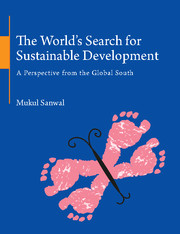Book contents
- Frontmatter
- Dedication
- Contents
- Preface
- Acknowledgments
- Abbreviations
- INTRODUCTION
- 1 Social Dimension of Sustainability
- CONSUMPTION IN AN UNEQUAL WORLD: FRAMING INTERNATIONAL COOPERATION
- CLIMATE POLICY: GLOBAL TO NATIONAL
- SUSTAINABLE DEVELOPMENT: NATIONAL TO GLOBAL
- CONSUMPTION IN A MORE EQUAL WORLD: SHAPING SOCIETAL FUNCTIONS
- GEOPOLITICS TO GEOECONOMICS: RURAL–URBAN DIVIDE, RATHER THAN BETWEEN COUNTRIES
- THE ASIAN CENTURY
- Index
1 - Social Dimension of Sustainability
Published online by Cambridge University Press: 18 December 2015
- Frontmatter
- Dedication
- Contents
- Preface
- Acknowledgments
- Abbreviations
- INTRODUCTION
- 1 Social Dimension of Sustainability
- CONSUMPTION IN AN UNEQUAL WORLD: FRAMING INTERNATIONAL COOPERATION
- CLIMATE POLICY: GLOBAL TO NATIONAL
- SUSTAINABLE DEVELOPMENT: NATIONAL TO GLOBAL
- CONSUMPTION IN A MORE EQUAL WORLD: SHAPING SOCIETAL FUNCTIONS
- GEOPOLITICS TO GEOECONOMICS: RURAL–URBAN DIVIDE, RATHER THAN BETWEEN COUNTRIES
- THE ASIAN CENTURY
- Index
Summary
In a unipolar, and post-colonial world, assured access to low-cost natural resources shaped economic growth pathways: industrialization, urbanization and lifestyles. A multipolar world is not able to keep commodity prices low modifying longer term trends shaping economic growth: urban design, community attitudes and individual decisions affecting natural resource use consumption patterns are taking place in an increasingly services oriented and knowledge-based economy, giving hope for finally moving sustainability from ideas to reality. In the twenty-first century, with unprecedented interdependence, wealth and inequality, sustainability is about the use and distribution, not scarcity, of natural resources – the neglected social dimension of sustainable development.
The impact of human activity on the global environment increased dramatically after 1950; by 1970, three-fourths of the population of industrialized countries had moved to cities, and the ‘American way of life’ soon became the ‘Western way of life’ as Europe rebuilt its cities, but at half the level of natural resource use in the United States. What is considered economic development is really based on use of natural resources for infrastructure and energy, electricity for lighting, heating, cooling and mechanical power, and oil powered cars, trucks and aircraft for transportation of people and industrial food production. High energy consumption affected every aspect of daily life with the promise of large houses in the suburbs, low price fuel, fast travel and foreign holidays, dining out, weekly shopping and new fabrics. Infrastructure–production and lifestyle–consumption systems reflected technological advances as well as social values and worldviews, which combined with low commodity prices, have led to path dependency of a high natural resource use and high carbon system. The citizens of these countries, until recently, were not even aware that two-third of the total national emissions of carbon dioxide emissions come from the residential, commercial and transport sectors which together constitute urban economic activity. Such was the power of ideas, institutions and rules that the imbalance being created in the planet was first described as global environmental change and later, to accommodate developing countries concerns, as sustainable development, without requiring any action at the personal level in the industrialized countries.
Re-emerging China and India, with three times the population of the industrialized countries, are adopting an ‘Asian way of life’ that is less energy intensive and wasteful, not so much focused on accumulation of material goods and with values and behaviour shaped by very different ancient civilizations.
- Type
- Chapter
- Information
- The World's Search for Sustainable DevelopmentA Perspective from the Global South, pp. 3 - 10Publisher: Cambridge University PressPrint publication year: 2015

